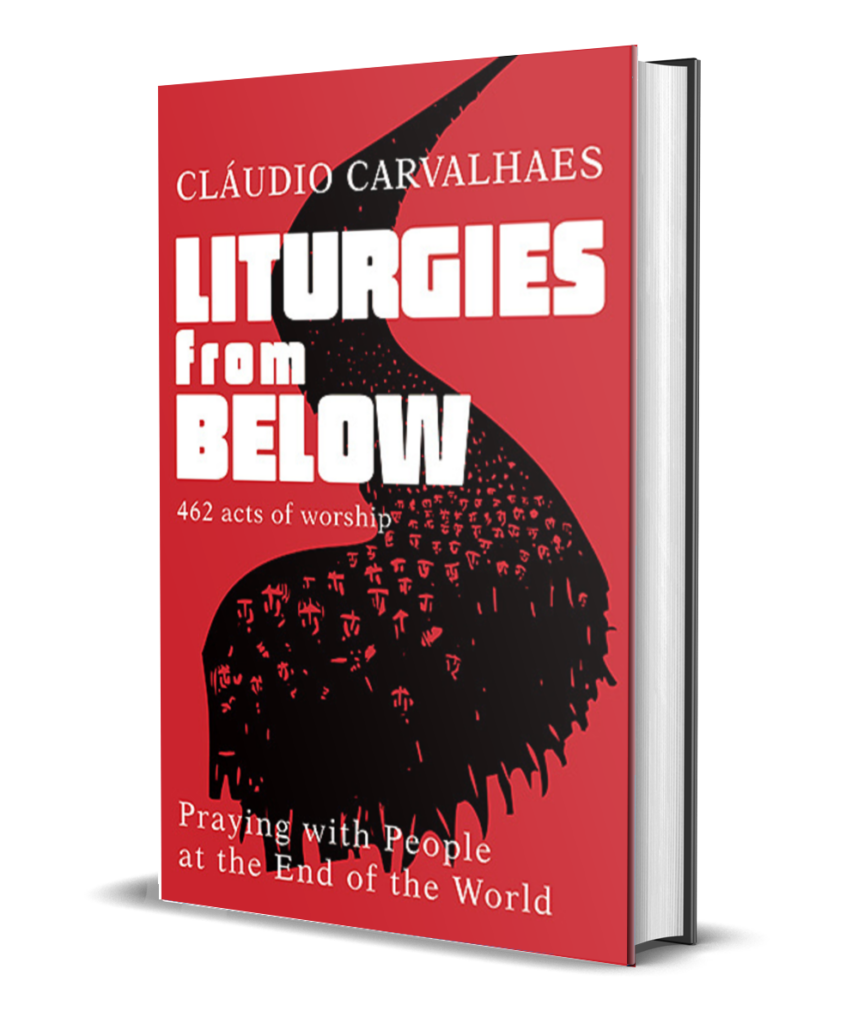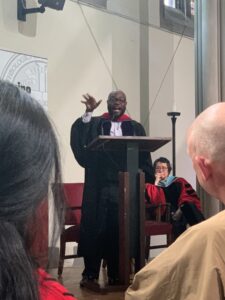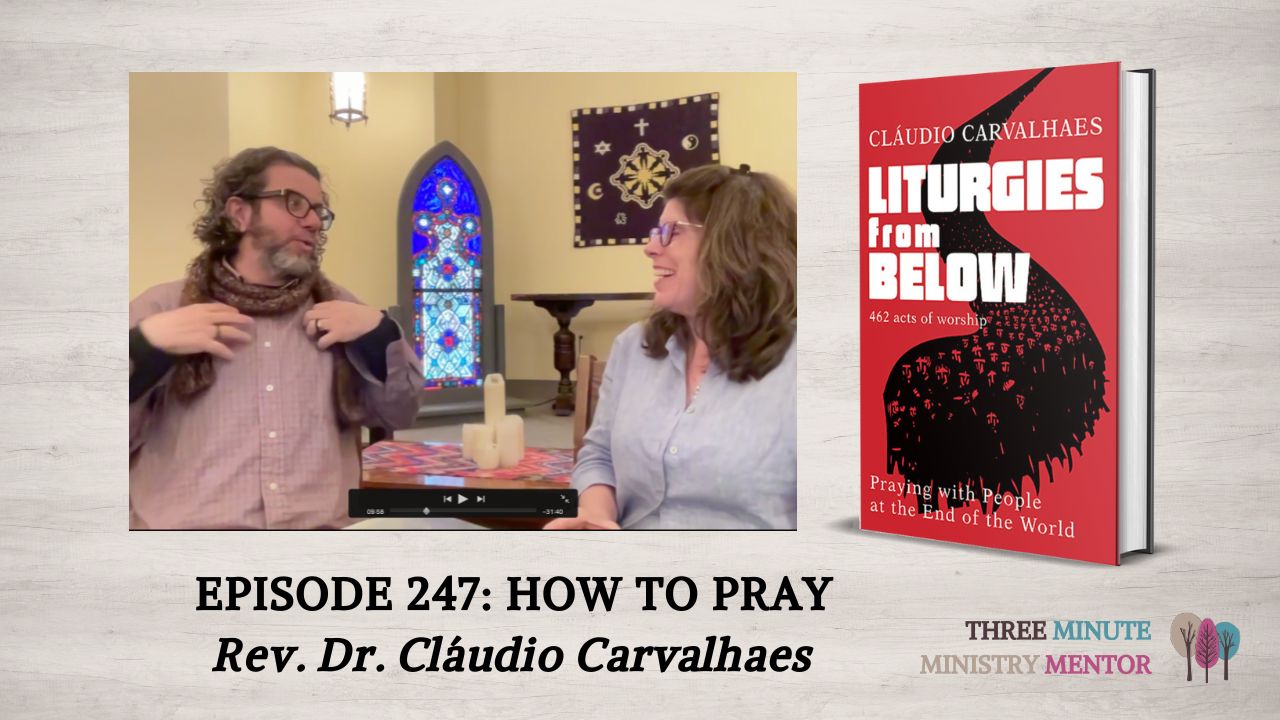In my conversation with Rev. Dr Cláudio Carvalhaes this week, we talk about how to pray. We begin with one of Claudio’s recent projects and books Liturgies from Below: Praying with People at the End of the World.

The project began with a hope from the Council for World Mission (CWM) in 2018-2019 to hear from people living in places of suffering. The CWM called the project, “Re-Imagining Worship as Acts of Defiance and Alternatives in the Context of Empire.” They hoped to expand the range of voices and contexts creating and sharing worship materials. The project included 100 people on four continents collaborating, listening, and creating prayers and liturgies local to their own contexts. These indigenous creations began in shared listening, and they are now available to the communities who collaborated and far beyond.
Prayer begins in listening
Cláudio and I begin our conversation in today’s episode with stories of how he gathered the liturgies and prayers. With funding from CWM, Claudio traveled and lived with four communities in the Asia-Pacific Islands, Africa, the Americas, and Europe.
He worked with local authors, pastors, artists, activists and students, as well as collaborative scholars to bring the project to life. The assembled team came from many social and religious locations, ethnicities, races, sexualities, churches, and Christian theologies. And in each country, they visited four locations where suffering and oppression are acute. They began by simply being in each community for three days and listening to the stories of the place and the people.
Listen to Cláudio recount a couple of stories of what happened as the team listened and then worshipped together.
Prayers for liberation
Cláudio says it was liberation theology that guided him in this journey. Prayers of liberation understand God as having a preferential option for people who are poor, dispossessed, and living in “situations burning with oppression.” Union Professor James Cone, Cláudio reminds us, says, Theology is what happens where it hurts.
When the greatest need for prayer is to cry out in pain and lament, there’s no possibility of liberation until people enter that moment fully and honestly and cry out to God. In our conversation, Claudio recounts a story when he thought it was all lost in the project. He was sure one of the participants would call it all off! He says, “In five minutes it’s over. I will be back on the plane and the project will be over.” His feeling came when the prayers for liberation were so full of suffering that they cried out with curses for God.
Have you been there, friend?
I certainly have. And I know God to be so much larger than my hurt and pain, so large to take in and hold all of that suffering. Cláudio makes the point that an overabundance of words and sheer silence (no words) are different ends of a spectrum. Each of these approaches to naming our situations with and beyond words are deeply connected to suffering.
A prayer for you
Since September 26 when Hurricane Helene made landfall, people from Florida, Georgia, North and South Carolina, eastern Tennessee, and up to Virginia and West Virginia have been living in a places of devastation. No water or power. No cell service or internet. And no roads in or out. Cut off from the basics of life and yet. And yet. And yet… I continue to encounter story after story of ministers organizing resources. Checking on their people and their neighbors. Raising money for their communities. Communicating the stories of suffering and even the small victories and daily miracles that happen when living through a natural disaster.
I give thanks for every pastor, minister, lay leader, and chaplain, who is shifting their vocation in this time of crisis. They weren’t prepared for what they are living through. But if the multiple pandemics which began in 2020 taught us anything, it is that improvisation, pastoral imagination, and spiritual presence are the greatest gifts we can offer to people in crisis.
A prayer for this season of uncertainty, loss and recovery
O God.
We give thanks for the many people who are aligning themselves with your mercy, your grace, your power, and your guidance
As they help one another to grieve,
help one another to survive,
and help one another to live.
Direct us in this work
that we might participate in your mercy, your grace, your power, and with your guidance.
We offer you our prayers and all the ones we cannot put into words this day.
Amyn.
Survivor’s Remorse
I learned this prayer concept from a new colleague at Union Theological Seminary, Rev. Dr. Willie François III. He spoke at Fall Convocation about survivor’s remorse. Something he has lived with for many years of his life when his friends and cousins faced death, incarceration, and violence in systems of oppression. Yet he remained, beyond death and incarceration by some miracle. Black men in America rarely escape the unfair, unjust marginalization and social death of racism and white supremacy.
 Willie François has refused to allow his survivor’s remorse to paralyze him. Instead, it motivates him to do the work of preaching and pastoring, teaching and theological education, bringing education to the New York State prison system.
Willie François has refused to allow his survivor’s remorse to paralyze him. Instead, it motivates him to do the work of preaching and pastoring, teaching and theological education, bringing education to the New York State prison system.
We can learn from Cláudio to listen to the prayers of people who are suffering. And we learn from Willie François not to become paralyzed, but instead activated to improvise and use our pastoral imagination and spiritual presence in each situation where we find ourselves.
Prison. Flood. Regular 10:30 AM Sunday morning service. Hospital bedside. Hospice room. Leading protests to save children’s lives and protect human rights. Raking mud. Distributing water dropped from a helicopter. Directing care. Becoming a conduit for funding and resources in a disaster. Becoming the hands and feet and eyes and ears of Christ.
This is how we pray. How we embody care and compassion. How we enter the situations of life through listening, lamenting, and liberating.
“Sending Forth so that God may Happen”
Hey! You!
Life urges us on every day with what is just
and what is needed from each one of us:
Work diligently for justice,
Love so that mercy has concrete gestures on our part.
And be humble with whoever is by our side as if they were God.
Let us go in peace,
Let us serve with joy,
And may the grace of our brothers and sisters,
The love of our mothers,
And the contagious force of dignity:
Be in our lives for God to happen!
Amen.




